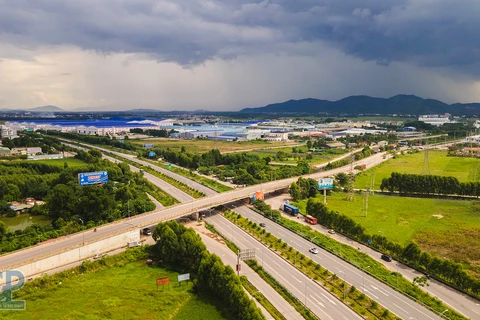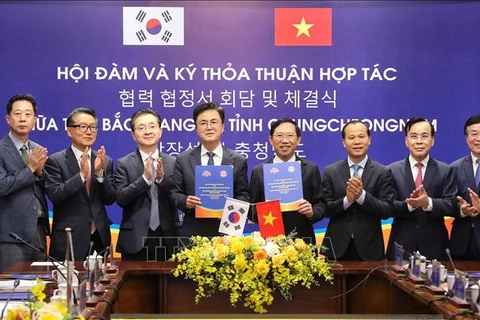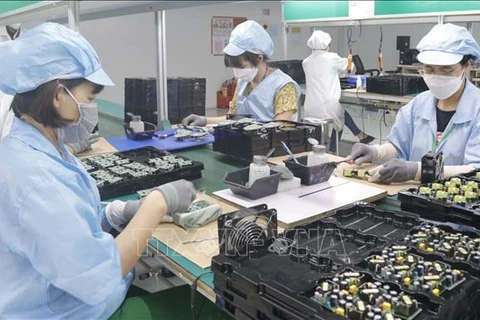 Bac Giang will promote the transfer and application of scientific and technological advances in agricultural, forestry and fishery production. (Photo: bacgiang.gov.vn)
Bac Giang will promote the transfer and application of scientific and technological advances in agricultural, forestry and fishery production. (Photo: bacgiang.gov.vn) Bac Giang (VNA) – The northern province of Bac Giang will focus on improving the quality and efficiency of the implementation of science-technology tasks to serve local socio-economic development, Director of the provincial Department of Science-Technology Nguyen Thanh Binh has said.
It will give guidance to organisations and individuals to raise the quality of science-technology proposals and hold dialogues with relevant agencies to remove difficulties for the implementation of science-technology tasks, while promoting technology transfer.
In 2024, the locality will step up science-technology research in matters related to land, natural disasters and climate change, and chemical, physical, biological and geological phenomena.
It will apply artificial intelligence (AI) and internet of things (IoT) to build a flood forecasting and monitoring system, and optimise the operation of pumping stations, thus improving Bac Giang city’s drainage capacity during the rainy season.
In agriculture, natural resources and environment sectors, Bac Giang will encourage the research and application of biotechnology in selecting and preserving plant and animal varieties with high quality and values, with priority given to typical endemic species as well as in diagnosing and preventing plant and animal diseases, and seeking suitable ways to treat and utilise by-products of agriculture.
Since 2013, Bac Giang has earmarked nearly 375 billion VND (15.47 million USD) from the state budget to science-technology activities.
Over the past time, science-technology projects rolled out in the province have served local socio-economic development, and helped to link production with market, and tap typical advantages of ecological areas.
Socio-scientific research outcomes, such as the national project on preserving and upholding the values of the documentary heritage of Vinh Nghiem and Bo Da pagodas, have created the scientific basis for the conservation work.
Bac Giang has launched a number of science-technology projects at provincial and national levels addressing issues related to climate change, resources management and environmental protection, including the production of concrete bricks from available ash and slag, software building for farming land management and use, online information system for land management, and the application of remote sensing technology and Geographic Information System (GIS) in wildfire prevention.
The locality has also utilised the results of research studies to boost large-scale agricultural production and high-tech agriculture, and combine agriculture with industry and services.
Notably, Bac Giang will promote the transfer and application of scientific and technological advances in agricultural, forestry and fishery production. Accordingly, the province focuses on applying good agricultural practices (VietGAP, GlobalGAP), clean production technology and biotechnology; develop organic agriculture; ensure food safety and hygiene; and protect the environment.
The locality will encourage the building of ecological and environment-friendly agricultural models such as organic agriculture and closed-loop circular agriculture.
In addition, Bac Giang will promote mechanisation in production, harvesting, preservation and processing to improve the productivity, quality and competitiveness of the local agricultural sector. The focus is to connect with other sectors and fields to form smart agricultural production adaptive to climate change and diseases.
Since 2021, Bac Giang has paid attention to applying science and technology to agricultural production. The province has researched and piloted the plantation of new rice species with high yield and good quality suitable to the growing areas and ecology of the province. The idea behind the move is to select two species with the best yield and quality for both domestic consumption and export./.






















